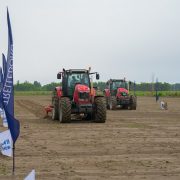El Salvador: IICA collaborates with the Ministry of Agriculture to revive coffee cultivation
The Ministry of Agriculture and Livestock of El Salvador and the Inter-American Institute for Cooperation on Agriculture (IICA) have signed an agreement to revive coffee cultivation in this country. This agreement, signed by IICA Director General Víctor M. Villalobos and the Minister of Agriculture of Livestock and President of the National Center for Agricultural and Forestry Technology (CENTA), Orestes Ortez, will serve to strengthen and improve the sustainability and competitiveness of the coffee chain.
This initiative is part of the policy of reactivation of coffee cultivation carried out by the Salvadoran government through its Ministry of Agriculture and Livestock (MAG)
The signing of this collaboration agreement, signed through CENTA, seeks to promote dialogue and cooperation for the implementation of plans, programs and actions in the coffee sector, as well as to support the development of activities that facilitate the implementation of the Program Center for the Integral Management of Coffee Roasted Coffee (PROCAGICA).

Signing of the agreement between the Director General of IICA and the Salvadoran Minister of Agriculture (right).
In the words of Minister Ortez, “this project will allow us a greater reach in the intervention that is being done in the fight against the rust that affects the coffee and is coincident with the public policy of the country. We are directly attacking the fungus with programs of technical assistance, fumigation and with the renovation that constitutes the central platform of the structural confrontation to the rust problem “.
Salvadoran Minister of Agriculture: “we have managed to sustain the production of coffee and prevent deterioration, and we have also renewed 29% of the coffee park in the country”
For its part, the director general of IICA explained that PROCAGICA has a financial component that seeks to contribute to the recovery of regional coffee.
The project has two fundamental objectives: to look for the mechanisms that allow better management of the disease and to be better prepared for climate change and its consequences
“IICA can not do this project alone, so the alliance with the governments is fundamental and with other partner institutions that have to contribute their knowledge by their specialties,” said Villalobos.
This collaboration agreement will be valid for five years, from the date of signature, and may be extended automatically, for equal periods of time.
CENTA and IICA will work together in:
- The areas of project management.
- Identification of opportunities for national, regional and international cooperation.
- The strengthening of competitiveness and sustainability strategies for innovation, research, training and technology transfer in the coffee chain.
- Rural development.
- Resilience and comprehensive risk management in coffee.
- The productivity and sustainability of family agriculture.
- Agricultural health and food safety.
The signatories of both institutions have reiterated their commitment to work to continue strengthening coffee production, providing better conditions for the families that produce this crop
Source: IICA
YOU MIGHT ALSO LIKE:
➡️Mexico and IICA help revitalize the coconut industry in Granada
















